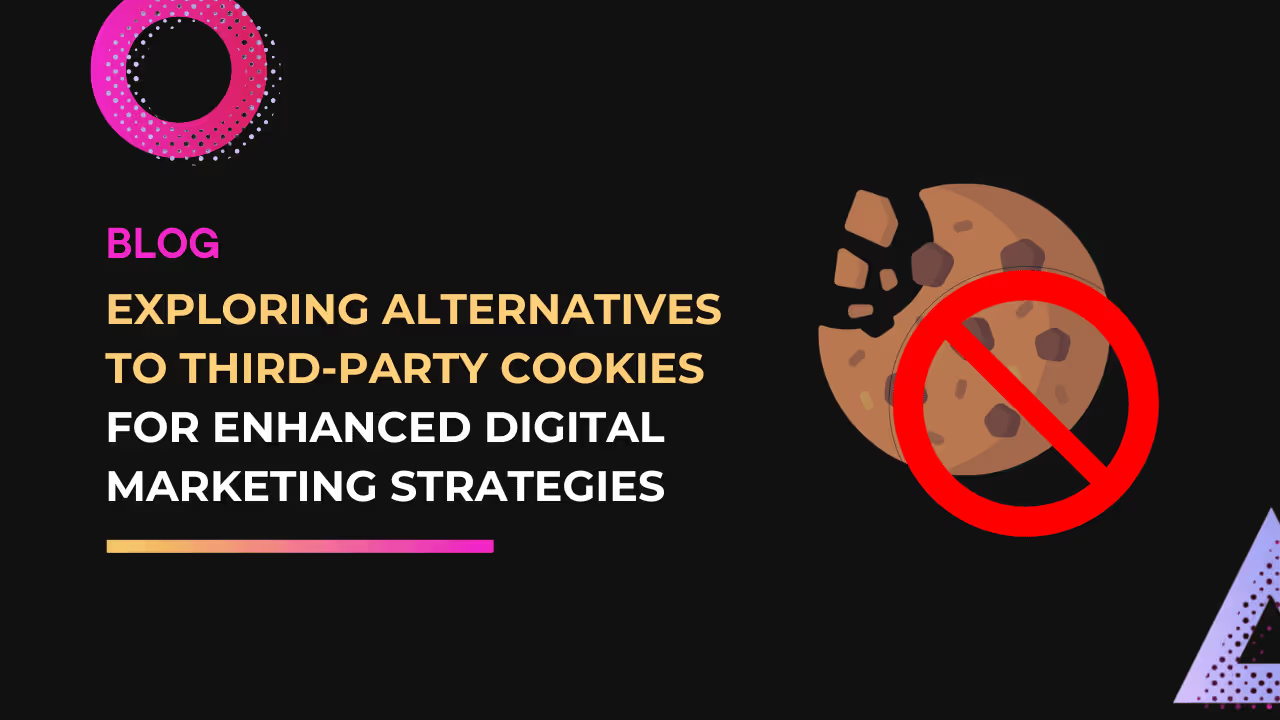El panorama del marketing digital está experimentando una transformación significativa con El anuncio de Google de eliminar gradualmente las cookies de seguimiento de terceros. Esta evolución está impulsando a los profesionales del marketing a buscar alternativas eficaces a las cookies de terceros para mantener la precisión de su publicidad. Adoptar nuevas estrategias que prioricen la privacidad de los usuarios y, al mismo tiempo, ofrezcan publicidad dirigida es ahora más crucial que nunca. Este artículo ofrece información sobre la comprensión del papel de las cookies en el marketing digital y explora alternativas prácticas a las cookies de seguimiento de terceros.
Comprender el papel de las cookies en la publicidad digital
Las cookies han desempeñado un papel decisivo en la publicidad digital, ya que permiten a los especialistas en marketing recopilar datos esenciales, como las preferencias del usuario y el historial de navegación, y las cookies han desempeñado un papel fundamental en la publicidad digital durante muchos años, ya que permiten a los especialistas en marketing recopilar datos cruciales como las preferencias de los usuarios, el comportamiento de navegación y las interacciones con el contenido en línea. Estos pequeños archivos de texto que se almacenan en los dispositivos de los usuarios cumplen diversas funciones, ya que ayudan a los anunciantes a ofrecer experiencias personalizadas y anuncios segmentados.
Cookies de sesión: Estas cookies permiten a los sitios web rastrear las acciones de los usuarios en una sola sesión de navegación, lo que garantiza una navegación fluida y habilita funciones como los carritos de compras o las sesiones de inicio de sesión.
Cookies persistentes: Estas cookies se almacenan durante un período más largo y ayudan a recordar la configuración del usuario, las credenciales de inicio de sesión y las preferencias en varias visitas. Contribuyen a una experiencia más personalizada para los usuarios que regresan.
Cookies de seguimiento de terceros: Estas cookies son colocadas por anunciantes o plataformas externas, lo que les permite recopilar datos detallados sobre los hábitos de navegación de los usuarios en diferentes sitios web. Esta información permite realizar campañas publicitarias altamente segmentadas y adaptadas al comportamiento individual de los usuarios.

Sin embargo, con la creciente preocupación por la privacidad, el panorama de la publicidad digital está evolucionando. La creciente demanda de alternativas a las cookies de terceros está obligando a los profesionales del marketing a buscar nuevas formas de recopilar información sin dejar de respetar los derechos de privacidad de los usuarios. A medida que las normas de privacidad se vuelven más estrictas y los consumidores son más conscientes de sus datos, el papel de las cookies en la publicidad digital es objeto de escrutinio, y las alternativas a las cookies de terceros se están convirtiendo en un objetivo fundamental para los profesionales del marketing.
El cambio a estrategias de marketing centradas en la privacidad
La industria del marketing digital está siendo testigo de un cambio de paradigma significativo hacia estrategias centradas en la privacidad, impulsado por la creciente preocupación por la privacidad en línea y la seguridad de los datos. A medida que los consumidores son más conscientes de cómo se utiliza su información personal, aumenta la demanda de una mayor transparencia y control sobre sus datos. Google está sentando las bases para un futuro sin cookies mediante la eliminación gradual de las cookies de seguimiento de terceros, por lo que los profesionales del marketing se ven obligados a replantearse sus enfoques.
En este panorama en evolución, los profesionales del marketing están explorando alternativas innovadoras a las cookies de terceros para recopilar información valiosa sobre los consumidores y ofrecer publicidad personalizada sin comprometer la privacidad. Las estrategias de marketing centradas en la privacidad son ahora más importantes que nunca, ya que las empresas se esfuerzan por cumplir con las normativas de privacidad más estrictas, como el RGPD y la CCPA, sin dejar de atraer a los clientes con contenido relevante y específico. A medida que disminuye la dependencia de las cookies de terceros, la búsqueda de alternativas viables a las cookies de terceros se está convirtiendo en una parte fundamental de la transformación del marketing.
Alternativas eficaces a las cookies de terceros
A medida que el panorama del marketing digital se aleja de las cookies de terceros, los especialistas en marketing deben recurrir a alternativas eficaces que respeten la privacidad del usuario y, al mismo tiempo, mantengan la precisión de la publicidad dirigida. A continuación se muestran algunas de las alternativas más prometedoras a las cookies de terceros:
1. Aprovechar los datos de terceros
Los datos de terceros, que los consumidores comparten voluntariamente, proporcionan una forma altamente ética y transparente de recopilar información valiosa sobre los usuarios. A diferencia de las cookies de terceros, los usuarios proporcionan estos datos de forma explícita, a menudo mediante interacciones como encuestas, ajustes de preferencias o cuestionarios. Al aprovechar los datos de terceros, los profesionales del marketing pueden generar confianza en su audiencia y crear campañas de marketing más personalizadas y relevantes. Este enfoque permite una comprensión más profunda de las necesidades de los clientes, al tiempo que respeta su privacidad y les da el control sobre la información que comparten.
2. Utilización de las redes sociales para publicidad dirigida
Las plataformas de redes sociales se están convirtiendo en una herramienta clave para los anunciantes que buscan alternativas a las cookies de terceros. Gracias a sus avanzadas capacidades de segmentación, estas plataformas permiten a los profesionales del marketing ejecutar campañas publicitarias de gran precisión en función de la demografía, los intereses, los comportamientos e incluso las acciones en tiempo real de los usuarios. Al utilizar datos de primera mano recopilados directamente de los usuarios de las redes sociales, los profesionales del marketing pueden seguir ofreciendo anuncios altamente segmentados sin depender de las cookies de terceros. Este cambio hacia la recopilación de datos basada en plataformas garantiza que se respete la privacidad de los usuarios y, al mismo tiempo, permite una segmentación eficaz de la audiencia.
3. Adopción del entorno limitado de privacidad de Google
La iniciativa Privacy Sandbox de Google ofrece una alternativa prometedora a las cookies de terceros, ya que proporciona un conjunto de tecnologías que preservan la privacidad y protegen los datos de los usuarios y, al mismo tiempo, permiten a los anunciantes publicar anuncios personalizados. Gracias a herramientas como FLoC (aprendizaje federado de cohortes) y la nueva API Topics, Privacy Sandbox permite a los anunciantes dirigirse a las audiencias pertinentes basándose en categorías de interés amplias, en lugar de en un seguimiento individual. Este enfoque garantiza que la publicidad pueda seguir siendo eficaz sin comprometer la privacidad de los usuarios, lo que lo convierte en una solución atractiva para los profesionales del marketing que buscan adaptarse a un futuro sin cookies.
A medida que estas alternativas a las cookies de terceros siguen ganando terreno, los profesionales del marketing deben mantenerse informados y ser ágiles a la hora de implementar estas soluciones para mantener estrategias publicitarias personalizadas y respetuosas con la privacidad.

Conclusión
El fin de las cookies de terceros marca el comienzo de una nueva era en el marketing digital, en la que la privacidad y la personalización van de la mano. Al adoptar alternativas como los datos de terceros, la publicidad segmentada en las redes sociales y las tecnologías de apoyo centradas en la privacidad, puedes afrontar esta transición sin problemas y asegurarte de que tus estrategias de marketing digital sigan siendo eficaces y cumplan con los cambiantes estándares de privacidad.
Para monitorear de manera efectiva las estrategias de marketing digital, el uso de herramientas de auditoría como Capa de datos es indispensable. Con Capa de datos, puede simplificar la generación de informes de datos, ahorrar tiempo y minimizar los errores manuales que podrían afectar significativamente a su estrategia. Comience su prueba hoy para experimentar cómo Dataslayer puede optimizar su flujo de trabajo y aumentar la eficiencia.







